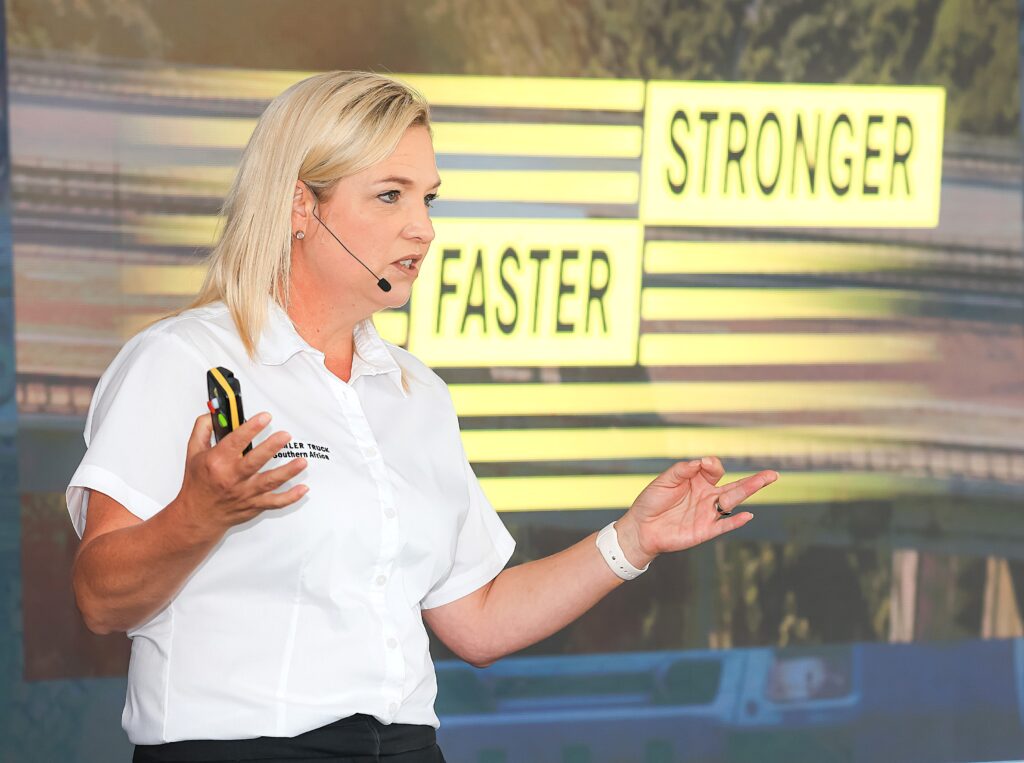Maretha Gerber, President and Group CEO of Daimler Truck Southern Africa, has urged the government to move swiftly in aligning the country’s truck emission standards with global norms, warning that South Africa risks being left behind if legislation continues to lag writes Patrick O’Leary.
Speaking at a Daimler Truck Experience event held recently at Gerotek, Gerber noted that while European markets already operate on Euro 6 standards – and have adopted Euro7 for later introduction – South Africa remains on Euro 2.
“We’re trying to convince the government to move,” she said. “As a concerted effort through the OEMs, we have written letters to the ministers – especially the Minister of Energy and the DTIC – to emphasize that we cannot prolong this as an industry. We have to progress.”
She stressed that manufacturers are ready to introduce cleaner and more advanced trucks into the market but outdated regulations are holding the industry back.
“As an OEM, I cannot bring in a Euro 6 truck here with the promise of the full benefits it offers if the emissions are still at Euro 2. We are even struggling with electric vehicle efforts. The legislation has not progressed to enable us to bring in all the options.”
Gerber warned that customers are losing out on advanced technology, while the country risks being excluded from global transformation in the industry. “If the industry doesn’t transform, we will be left behind as a country. We will again be meeting with ministers at the Naamsa SA Auto Week (being held Oct 1 – 3rd) to stress this point, because really, the industry needs to transform.”
Daimler Truck Board fully supportive
Turning to Daimler’s global perspective on South Africa, Gerber said the board in Germany remains fully supportive of the local operation despite the country’s economic and political challenges.
“I think the board is 100% aware of the challenging market we’re in. We have consciously made it very transparent – the immense competition, the volatility – and South Africa remains a very important part of Daimler because South Africa looks after Africa,” she said.
Gerber confirmed that Daimler Truck continues to invest in new products and services, including dashboards, truck rental programmes and other initiatives that go beyond vehicle sales.
“From the Daimler view, South Africa is a critical part, even though it’s tough times. We get all the support we need from our management board in Germany to transform and change our business to be ready for whatever comes our way.”
However, she stressed that future investment hinges on greater stability. “Economic stability remains key, because without that, global conglomerates will not invest – and we have already invested heavily in South Africa. But to reinvest and reinvest, we need economic stability, infrastructure advancement and legislative change.”
Despite the pressures facing the trucking sector, Gerber pointed to positive momentum in areas such as construction and passenger transport. “Buses are back,” she said, noting that renewed demand reflects more commuter activity, job creation, and new energy in the public transport sector.
Gerber also welcomed government’s commitment to shift more freight from road to rail. “With road-to-rail, more jobs will be created and the right trucks will operate in the right industries, not transporting the things that should be on rail.”
Concluding on an optimistic note, she said Daimler remains confident about South Africa’s long-term prospects. “The overall sentiment is that South Africa is going through a tough time but the Daimler board remains 100% behind us to make it work here.”
Click on photograph to enlarge




